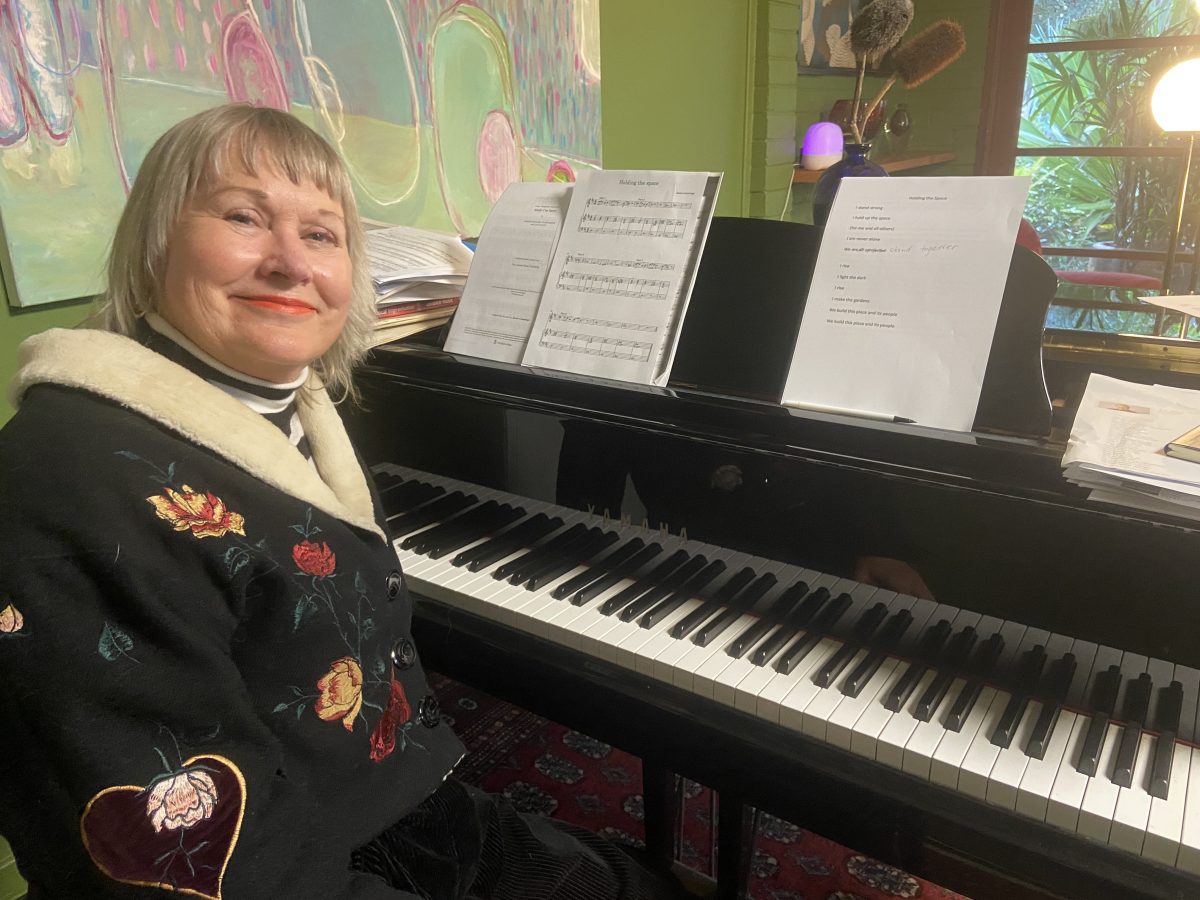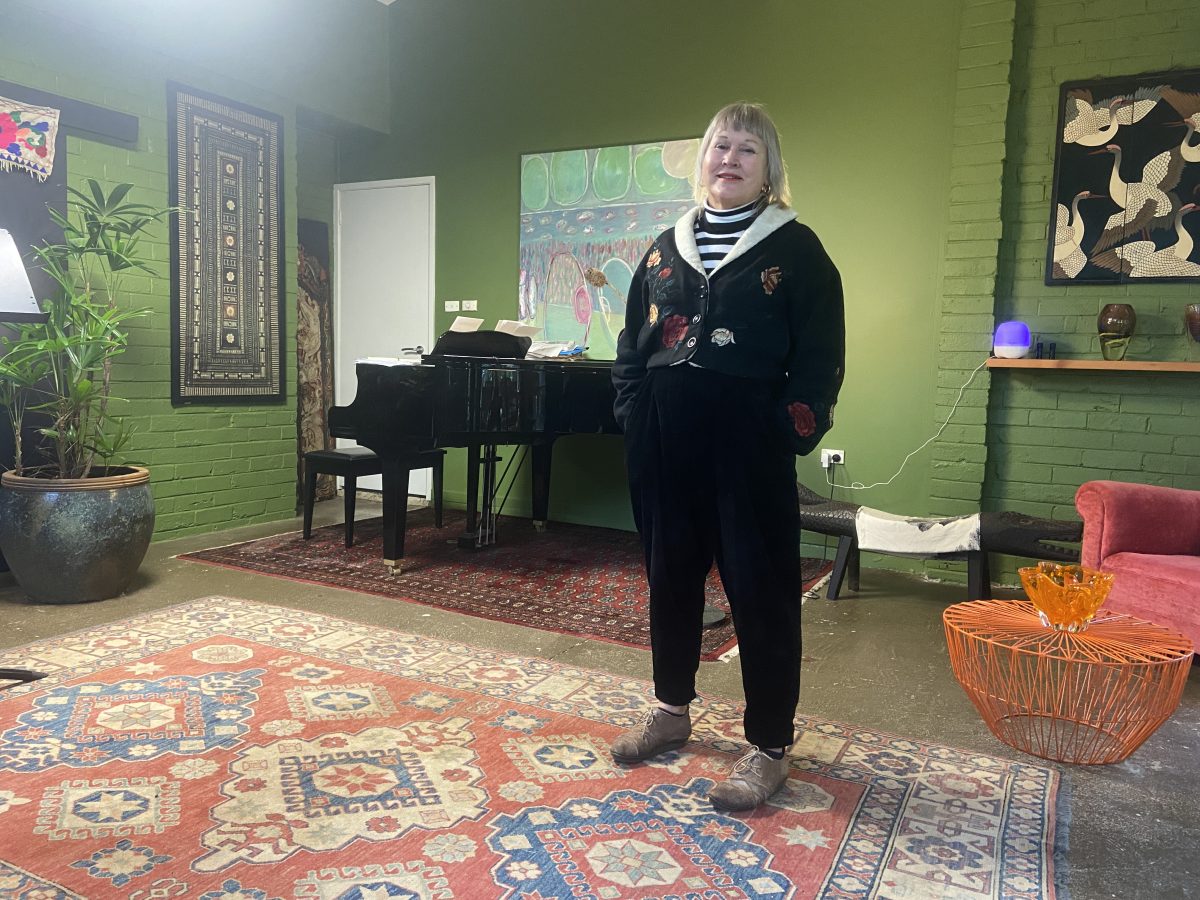
Opera singer, teacher and now producer – Karen Cummings is bringing to life the story of Bulli Mine No.2 through music and performance. Photos: Dione David.
As an opera singer, Karen Cummings has enjoyed an illustrious career performing all around Australia and beyond.
She was a Spring Festival of New Music solo vocalist, performing with Roger Woodward AC OBE, among other virtuosos. For a decade she performed in and mentored on Australia’s first Indigenous opera, Deborah Cheetham’s Pecan Summer. She was in Richard Vella’s Tales of Love for Sydney Festival and has even graced the hallowed stages of the Opera House itself.
Little did she know that when she moved to Coledale some 20 years ago she would discover inspiration from a seemingly humble source.

Karen stands in her home studio where much of the work on Our Hearts Beat: Hidden Histories takes place.
After moving Karen continued performing in Sydney and the Illawarra before branching into teaching at the Wollongong Conservatorium and University of Wollongong.
Then during lockdown, she tried her hand at producing content – a song for Creation, an oratorio that has toured events statewide. It was a gateway to the natural next phase of her career, creating her own production.
Our Hearts Beat: Hidden Histories is a musical theatre production currently in its infancy, backed by first-stage funding from Merrigong Theatre Company.
On the surface, it tells the stories of Bulli No.2 Mine, which Karen has been inadvertently collecting in conversations with her neighbours and the broader community for years.
“When I first moved here one of the things I liked to do was walk up and down Morrison Avenue and Buttenshaw Drive and I’d meet people,” she says.
“I just loved how they’d wave you over for a bit of a chat. People wanted to get to know you. There were a lot of older people who knew the history of the area and if you were interested they would tell you.
“Many were European migrants, like Gretel and Peter. Peter was Dutch and a former prisoner of war. Gretel was a young German woman. Their families thought it was the most outrageous thing that they wanted to marry, so they moved out here. He got a job at a youth detention facility and Gretel used to go into the escarpment and cut stones out for the downstairs of their house, which was a replica German farmhouse. They knew a lot about this area and about the mines.
“I also managed to track down two men who actually worked in the mine. The stories they told me …”

Bulli Mine No.2 is almost literally in the backyard of Karen’s Coledale home.
Built in the 1800s, only 11 people (including some boys) and a handful of pit ponies worked No.2, walking one kilometre into a mine that was three feet high.
Karen heard stories of the many lives claimed in Illawarra mine disasters, and how locals held memorials to this day. In all the stories, there was one recurring theme.
“These were people who didn’t have a great deal of choice as to where they lived or what work they did to survive but they had this incredible care for each other,” she says.
“When people were being evicted, they’d trigger the ‘information tree’ because they didn’t have phones, and everyone would turn up to stop the eviction. If one group of miners went on strike – and it was often around basic rights such as safety from the noxious gases – they all turned up and fought for it together.”
A combination of theatre, song and movement, Our Hearts Beat is shaping up to be both a tribute to this rich history and an anthropological study into the human response to adversity.
“Something I’ve been thinking about a lot in the time we live in, and going through things like bushfires and pandemic together is – what does it mean to be connected to the place you live and the people that live in it? What does it mean to care for it all?” Karen says.
“In my research I have discovered that when faced with bushfire, flood or working in a mine – any situation where we’re under prolonged strain, humans respond by building connection and community.”
At the same time, Karen says there’s a “weird sort of tension” surrounding the phasing out of fossil fuels.
“Mining is not good for the environment, but that’s separate to what the mining communities in this area did and achieved,” Karen says.
“That’s why I feel the time for this story is now, with the waning of fossil fuels as we ask ourselves – what is the future of those communities?”
Our Hearts Beat: Hidden Histories is finally, an exploration of the “intangible resonance” of the mine and Coledale area.
“There’s a term for it – psychogeography – you feel something but you’re not sure what it is. It’s things that are hard to put into word, but easier to put into music,” she says.
“That’s ultimately what I want to do – create something out of our collective response to this place. Capture not just the human relationships, but the non-human and the essence of this place that has got nothing to do with us, that was there before we came, when Indigenous people lived here and will be there long after we’re gone.”









